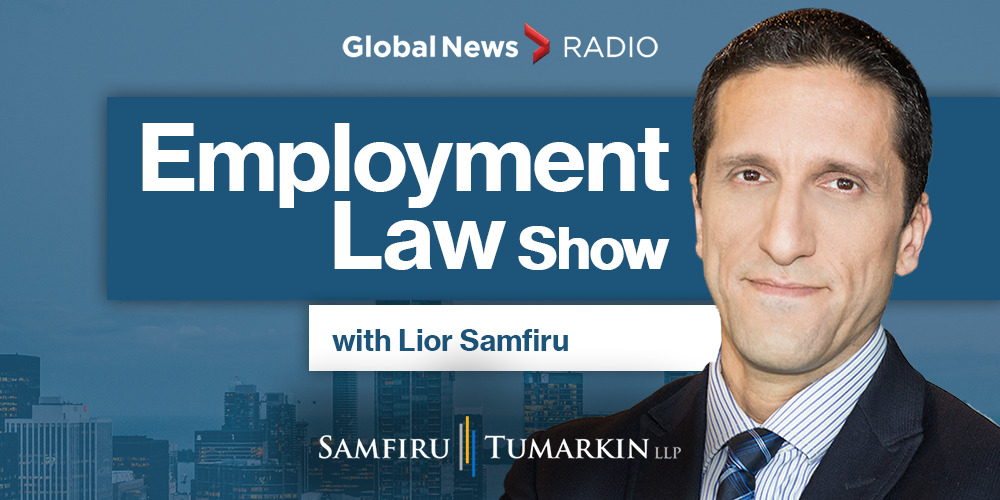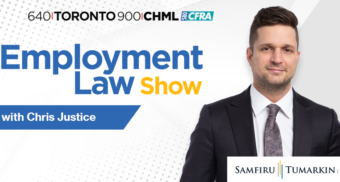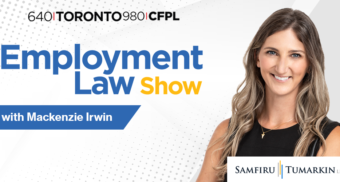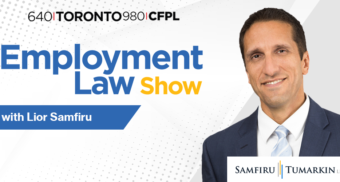Employment Law Show 640 Toronto – S8 E72

Layoffs during COVID-19, bonuses and severance pay, termination during a sale purchase, reduction in work hours and more on season 8 episode 72 of the Employment Law Show on Global News Radio 640 Toronto.
Employment Lawyer Lior Samfiru, Partner at Samfiru Tumarkin LLP, reveals your workplace rights in Toronto and the GTA on the Employment Law Show. Lior shatters myths and misconceptions about severance pay, terminations without and for cause, workplace harassment, overtime pay, wrongful dismissal, constructive dismissal, duty to accommodate, independent contractors, temporary layoffs and more.
What We Covered
Can my employer stop paying me an annual bonus after 6 years?
An employer can’t decide to eliminate an annual bonus if an employee consistently receives that bonus year after year. A routine annual bonus becomes a term of employment. If an employer makes a significant change to an employee’s terms of employment, the employee may be able to treat their employment as being terminated. This is called a constructive dismissal in Ontario. The employee can leave their job, with full severance pay.
Ontario government extends COVID-19 layoff period to 2021
The Government of Ontario has extended a special COVID-19 temporary layoff period from early September until January 2021. Lior explains how this decision impacts an employee’s provincial employment rights, but doesn’t stop an employee from potentially leaving their job now with severance pay through a constructive dismissal.
I accepted a severance package that didn’t include my annual bonus. Can I do something about it?
A typical severance package is based on numerous factors, including age, position, income and years spent with the company. Any bonus should also be calculated into severance pay. Once you sign back and accept a severance offer from your employer, you eliminate your ability to pursue full termination pay with help from one of our employment lawyers.
Your Rights During COVID-19: You Can’t Be Temporarily Laid Off
Despite what many employers and employees may have heard, a company does not necessarily possess the ability to place a worker on a temporary layoff due to the impact of COVID-19. While provincial legislation or regulations may allow for the suspension of an employee’s regional, statutory rights, their common law rights are not affected.
Under common law, an employee may have the option of treating a temporary layoff as constructive dismissal. They can treat their employment as being terminated, and resign from their job with a full termination package. An employee in this situation should contact us first before resigning, to ensure that the proper procedure is observed.
I have been on a temporary layoff since the start of COVID-19. What can I do about it?
An employee that was laid off at the outbreak of the COVID-19 pandemic, and is still on a layoff, may be able to pursue a constructive dismissal, and leave their employer with severance. Exceptions may apply in cases where layoffs are permitted by an employment contract or have been previously accepted by the employee.
My employer has stopped paying paying me extra for being on call, and I will lose money. Can they do that?
An employe is not allowed to make a significant change to an employee’s job, including their compensation. If an employer makes a change to a long-standing payment arrangement, an employee could argue for constructive dismissal and secure full severance pay under common law.
My hours have been cut back after being put on a performance improvement plan. What should I do?
An employer does not have an automatic right to scale back an employee’s hours in a serious way. Doing so could trigger a legitimate claim for constructive dismissal.
My doctor says I need to work from home due to surgery, but my employer wants me to come back to work. Do I have to?
If an employee’s doctor recommends that they work remotely due to health issues, an employer must comply with the request. A company has a duty to accommodate such requests from its workers. Refusing to do so could result in the employer committing a human rights violation.
My company is selling its shares to another company. Do we owe severance to our employees in this type of sale?
When a company sells its shares to another company in a sale purchase, the company’s employees are not considered to have been terminated. They are therefore not owed severance pay, unless the buyer of the shares decides to fire employees acquired through the transaction.
In an asset purchase, employees may view their employment as being terminated. In that case, they are entitled to full severance pay under common law, and based on the terms of their employment contract.
LEARN MORE
• Sale of a company in Ontario: Employee rights
• Company sold in Alberta: Who pays severance?
• Rights for employees when business sold in B.C.
I was laid off due to COVID-19 after 3 years with an insurance company. How much severance am I owed?
Non-unionized insurance company employees are guaranteed their minimum severance pay under the Employment Standards Act (based on certain qualifications) and full severance pay under common law. To calculate the amount of pay you may be owed, consult our Ontario Severance Pay Calculator.
Experiencing an Employment Issue?
Before you call a lawyer, use the Pocket Employment Lawyer to find out if you might have a case.
Use The Severance Pay Calculator to find out how much severance pay you may be owed upon termination.
Call 1-855-821-5900, email Help@EmploymentLawyer.ca or fill out a contact form to get help now from an Employment Lawyer Toronto.
Denied Long Term Disability? We Can Help.
Discover your rights when your Long Term Disability Claim is denied. Find out more here.




